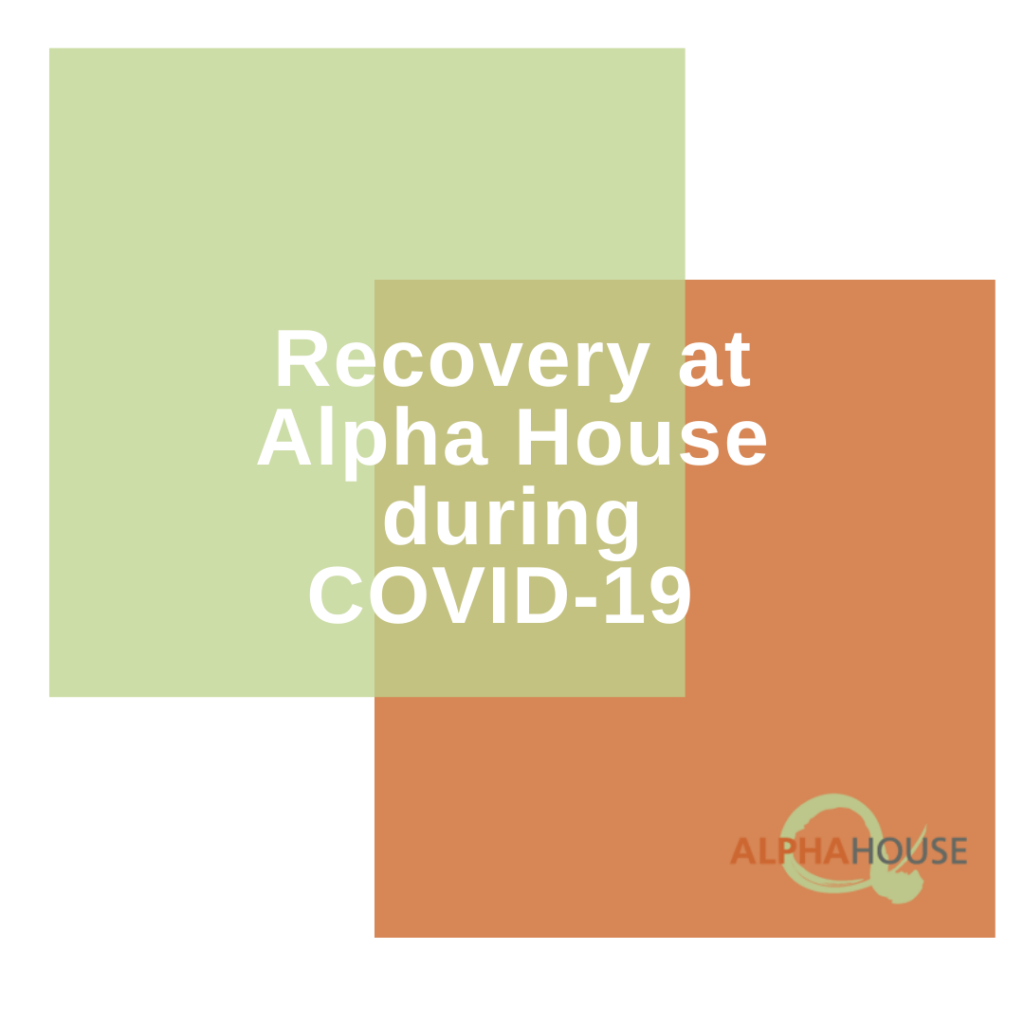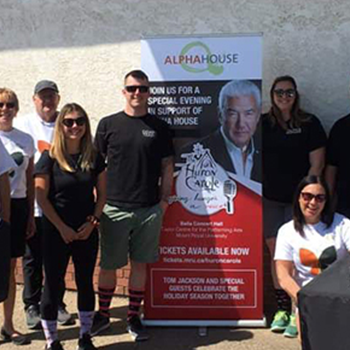Recovery at Alpha House During COVID-19
May 21, 2020 | Alpha House News David Blog Series News

For many of those who know Alpha House, you know that recovery and harm reduction principles and practices are part of our work culture and go hand-in-hand…two sides of the same coin.
The shared principles that bridge the dichotomy between harm reduction and recovery include:
- Respect
- Dignity
- Compassion
- Building trust and relationship
- Being non judgemental
- Increasing our quality of response
Alpha House has developed wise practices that work for people and their willingness for change. From our understanding change is incremental and begins with small steps. As someone recently coined it …practicing harm recovery.
“It may be that traditional <office-based> substance abuse programs continue to operate according to the philosophy that people with addiction disorders need to ‘‘hit bottom’’ and seek help for treatment to be successful. There has been a challenge to this paradigm in the trans-theoretical model proposed by Prochaska and DiClemente which posits that behavior change involves a process that occurs in increments. Change is viewed as a progression from a pre-contemplation stage—where the person is not considering a change; to contemplation—where the person is carefully weighing the pros and cons of changing; to preparation—where planning and commitments for change efforts are secured; to action—to make the particular change; to maintenance—in which the person works to sustain long-term changes. Also, Motivational Enhancement Therapy is an evidence-based practice in addictions treatment that views ambivalence as a part of the recovery process, and employs strategies to reduce ambivalence by building motivation.” [1]
Alpha House staff are keen observers of the stage of change model and motivational interviewing and use these tools to support the recovery of the men and women they serve. Along with our understanding of crisis management, trauma informed care, brain science, the complexity of alcohol and drug use, and the importance of fellowship and mentoring, Alpha House has created an extensive tool kit that help staff to build motivation with and for its clients. Alpha House’s commitment to those with alcoholic and substance abuse issues, often marginalized, homeless, and street engaged is to bring empowerment and inclusion while meeting them where they are at. In doing so, Alpha House responds daily to the chronic nature of addiction not just to its acute manifestations.
“You don’t get over an addiction by stopping using. You recover by creating a new life where it’s easier to not use. If you don’t create a new life, then all the factors that brought you to your addiction will catch up with you again.”
– Unknown
Alpha House, its staff and its clients are on the front line of COVID-19 and recovery. By building relationships, we are helping people to create new lives no matter what challenges precipitate. Many years ago in my first year at Alpha House a value statement emerged from the staff …simply put it stated that people we worked with were more than their addiction. How great is that…at the time 24 staff worked together to foster that value statement as part of its strategic plan for the agency. Now we have over 300 staff and that value statement still stands as we move forward with our clients every day. COVID-19 doesn’t preclude recovery…it provides an opportunity to re-frame a person’s belief that recovery isn’t possible. There is no good time for recovery except for the willingness to begin…one small step at a time.
The process begins anew every day. Stabilization and care are key as clients move through our programs of outreach, shelter, detox, and housing. Keeping people safe during COVID-19 is not different from reducing harm from their addiction and making space in people’s lives for recovery.
Given that clients don’t have access to treatment centres or to peer support step programs these days due COVID-19 it would seem that recovery has been pushed out of the picture. Crisis management however tells us otherwise…dialogue, active listening, and reframing as well as providing a safe and caring environment does foster change and can influence positive outcomes. Our work is more than planting seeds for change, it is observing and responding to what is already growing within each client. As we face this pandemic we do so together and we see clients as more than their addiction. We have been able to maintain detox scenarios throughout our pandemic response, though sometimes with reduced capacity. We have been able to encourage abstinence for those that want it by providing supportive touch and verbal and nonverbal communication as we move them from outreach, shelter to transitional beds and housing.
In our shelters in Calgary and Lethbridge, we educate and model for clients the importance of social distancing, hand washing, and continuous masking and we have increased access to nursing care including symptomatic and asymptomatic COVID-19 testing. The variables fluctuate but the path doesn’t, we don’t compromise on recovery because of COVID-19.
“The waveform that overwhelms a maturing human being from the inside is the inescapable nature of their own flaws and weaknesses, their self-deceptions and their attempts to create false names and stories to place themselves in the world; the felt need to control the narrative of the story around them with no regard to outside revelation. The immense wave on the outside is the invitation to give that self-up, to be borne off by the wave and renamed, revealed and re-ordered by the powerful flow. “ [2]
In our shelter and detox, stabilization and recovery includes offering things that make a difference:
- Increase phone access for clients so as to contact those they are worried about and encouraging them to reach out to those who may be worried about them due to COVID-19.
- Although in house services have been impacted that has meant an increase in staff time for each person with staff able to engage clients more deeply and frequently.
- Recovery includes providing respite and nourishment when other sources have closed or limited access.
- It also means making sure people have access to their medication and being able to address medical and mental health needs.
- Encouraging clients to develop routines and check-ins with staff
The people we work with have given us many anecdotal statements over the years. Their voices continue today to counter the judgements of those that don’t often value or know the nature of our work…but even more their voices counter the narratives that have constrained them in the past… they deserve to have the last comments of this post…
This was a life lesson for me, thank you for the opportunity and hospitality
Alpha House acknowledges the potential anybody has and is willing to help. I think that is magical
Everyone who helped me are angels! Thank you for giving me the first step towards taking my life back.
Thank you everyone for all the tools to set me sober, I fell as if this is a huge step forward in the right direction for me and my family, thanks.
The staff have been extremely helpful, especially with helping to get me through my low moments and to help me stay focused on what I have accomplished and steps I’m taking.
From dry out to sober living, Alpha House has been instrumental in my recovery
COVID-19 has impacted and limited activities [in Detox] but the positive influence of staff have helped me to stay sober.
David is marking his 25th year of service at Alpha House with a series of blogs. If you would like to share your story or comments with him you can reach him at [email protected]
[1] Assertive Outreach: An Effective Strategy for Engaging Homeless Persons with Substance Use Disorders into Treatment Deborah Fisk, L.C.S.W.,1Jaak Rakfeldt, Ph.D.,2andErin McCormack, M.S.W.
[2] CONSOLATIONS: The Solace, Nourishment and Underlying Meaning of Everyday Words. 2014. David Whyte and Many Rivers Press
